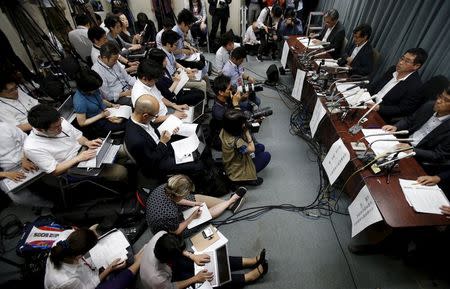Japan zoos, under pressure, give up buying dolphins from grisly hunt
By Elaine Lies TOKYO (Reuters) - Japan's association of zoos and aquariums said on Wednesday it will stop buying dolphins taken in a controversial hunt made famous in an Oscar-winning documentary, possibly raising pressure to halt the annual event Japan says is a tradition. The hunt, featured in the 2009 film "The Cove," involves driving hundreds of dolphins into a cove in the western port town of Taiji. Some are taken alive for sale to marine parks, some are released and the others are killed for meat, turning the water red with blood. Japan was told a month ago that it faced losing membership of the World Association of Zoos and Aquariums unless it stopped buying dolphins from Taiji. The loss of membership would mean Japan would lose access to zoo animals such as elephants and giraffes from overseas. Some officials decried what they said was "bullying" over the hunt. Kazutoshi Arai, head of the Japan Association of Zoos and Aquariums, told a news conference a majority of members voted to stop buying the dolphins from Taiji, but made clear the choice had been made reluctantly. Japan maintains that dolphins and whales are an important marine resource and should be hunted sustainably. "I'm not sure if the words 'foreign bullying' fit, but without question, there was a lot of campaigning by foreign anti-whaling groups behind the scenes," Arai said. Japan has had less success with breeding captive dolphins than its counterparts overseas, partly because of space limitations. Arai said access to wild dolphins was important to maintain genetic diversity. In 2013, 1,239 dolphins were caught in the Taiji drive hunt, according to the Fisheries Agency. Of these, 172 were sold alive, mainly overseas. Japanese media said many customers were from places such as China and the Middle East. Some 20 to 30 are bought for use in Japanese aquariums each year at a cost of about 1 million yen ($8,300) each, prompting accusations from environmentalists that the practice of selling dolphins for captivity keeps Taiji's hunt going. "We don't think taking the dolphins from the wild is cruel, we aren't criticising the hunt and we don't expect to change our stance," said Arai, who added that Japan had tried to come up with "gentler" ways of catching dolphins but the global group had not accepted them. "But this decision has been made by the international organisation, so we now have to put much more emphasis on breeding." (Reporting by Elaine Lies; Editing by Robert Birsel)



